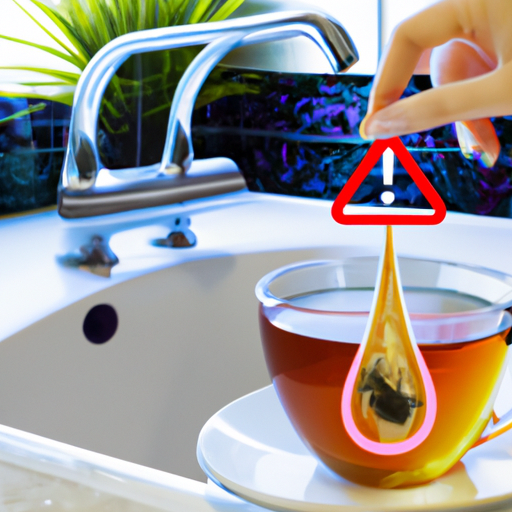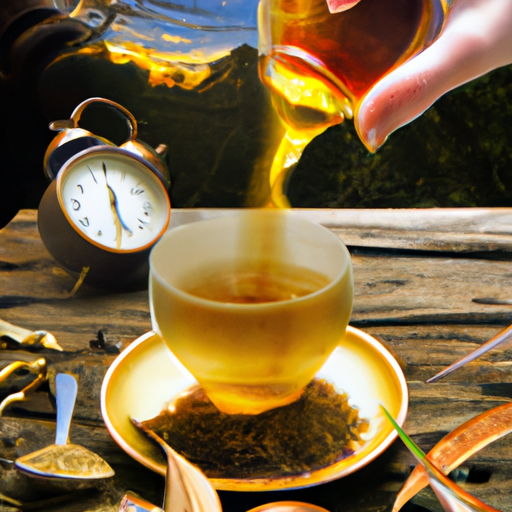Picture yourself sitting in a cozy chair, sipping on a steaming cup of herbal tea, feeling a sense of calm wash over you. It’s a comforting ritual that many of us enjoy, especially during pregnancy when we strive to prioritize our health and well-being.
However, when it comes to herbal tea, caution is key. As an expectant mother, it is important to be aware of the potential risks that herbal tea can pose to both you and your developing baby. While some herbal teas are generally considered safe during pregnancy, many others can have hormonal effects and complications that could potentially harm your pregnancy.
Unfortunately, there is a lack of scientific research and safety data on many herbal teas, making it difficult to determine their true safety during pregnancy. In this article, we will explore why it is wise to avoid herbal tea during pregnancy, specific teas to steer clear of, and safer alternatives to promote your well-being and hydration.
Your health and the health of your baby are of utmost importance, so let’s delve into this topic together and make informed decisions for a healthy pregnancy journey.
Key Takeaways
- Herbal teas during pregnancy can disrupt hormonal changes and increase the risk of preterm labor and pregnancy complications.
- Lack of scientific research and safety data on herbal tea during pregnancy makes it best to avoid it altogether.
- Excessive consumption of herbal tea can lead to hormonal imbalances and increased pregnancy complications.
- Some herbal teas, such as chamomile, peppermint, and raspberry leaf, can stimulate the uterus and potentially harm the pregnancy.
Potential Risks of Herbal Tea During Pregnancy
You should definitely avoid herbal tea when you’re pregnant because it can pose potential risks to you and your baby. While herbal teas are generally considered safe for consumption, they can have different effects on pregnant women due to hormonal changes and potential side effects.
During pregnancy, hormonal changes occur in your body to support the growth and development of your baby. Some herbal teas, such as chamomile and peppermint, contain compounds that may interfere with these hormonal changes. This can potentially lead to complications in pregnancy, such as preterm labor or miscarriage.
Furthermore, certain herbal teas may have potential side effects that can be harmful during pregnancy. For example, some herbal teas, like black cohosh or blue cohosh, have been associated with uterine contractions, which can increase the risk of preterm labor. Other herbal teas, such as raspberry leaf tea, may stimulate the muscles in the uterus and potentially result in pregnancy complications.
It is important to note that not all herbal teas are harmful during pregnancy. However, due to the potential risks associated with hormonal effects and pregnancy complications, it’s best to err on the side of caution and avoid herbal tea altogether.
Transitioning into the subsequent section about hormonal effects and pregnancy complications, it’s crucial to understand how certain substances can affect your pregnancy.
Hormonal Effects and Pregnancy Complications
Excessive consumption of herbal tea during pregnancy has been linked to potential hormonal imbalances and an increased risk of complications. It’s important to be cautious when consuming herbal tea while pregnant due to the hormonal changes that can occur and the potential risks it poses to both the mother and the baby. Here are four key points to consider:
-
Hormonal changes: Herbal teas contain various active compounds that can interfere with the hormonal balance in the body. This can disrupt the delicate hormonal environment required for a healthy pregnancy and may lead to complications.
-
Pregnancy risks: Some herbal teas, such as those containing black cohosh or licorice root, have been associated with an increased risk of preterm labor, miscarriage, or birth defects. It’s crucial to avoid these teas to minimize any potential harm.
-
Lack of safety data: Unlike prescription medications, herbal teas don’t undergo rigorous testing and regulation. Therefore, there’s a lack of scientific research and safety data regarding their effects on pregnant women. It’s better to err on the side of caution and avoid herbal teas altogether.
-
Consult your healthcare provider: If you have any concerns or questions about consuming herbal tea during pregnancy, it’s essential to consult with your healthcare provider. They can provide personalized advice based on your specific situation.
The hormonal effects and potential complications associated with excessive consumption of herbal tea during pregnancy make it important to exercise caution. However, it’s worth noting that there’s a lack of scientific research and safety data on this topic. Transitioning into the next section, it’s crucial to explore the limited available evidence and the need for further research on the safety of herbal tea during pregnancy.
Lack of Scientific Research and Safety Data
When it comes to herbal tea during pregnancy, it’s important to note that there is a lack of scientific research and safety data available. Limited studies have been conducted on the effects of herbal tea specifically during pregnancy, leaving us with insufficient information on dosage and long-term effects.
This is why it’s crucial for pregnant individuals to consult with their healthcare providers before consuming herbal tea, as they can provide personalized guidance and ensure the safety of both the mother and the baby.
Limited Studies on Herbal Tea During Pregnancy
Although information on the effects of herbal tea during pregnancy is scarce, it’s advised to approach its consumption with caution. There are limited studies available that specifically analyze the effects of herbal tea on pregnant women. While some herbal teas may offer potential benefits, such as soothing digestive issues or providing relaxation, there are conflicting opinions regarding their safety during pregnancy.
Some herbal teas may contain ingredients that could potentially harm the developing fetus or affect hormonal balance. It’s important to note that the lack of scientific research and safety data on herbal tea during pregnancy makes it difficult to determine its overall safety. Additionally, there is insufficient information on dosage and long-term effects.
Therefore, it’s recommended to consult with a healthcare professional before consuming herbal tea while pregnant to ensure the well-being of both the mother and the baby.
Insufficient Information on Dosage and Long-Term Effects
While there’s limited information available on the dosage and long-term effects of herbal tea, it’s important to consult with a healthcare professional to ensure the safety of both the mother and the baby during pregnancy.
Without proper dosage regulation, there’s a risk of consuming excessive amounts of certain herbs, which may have adverse effects on pregnancy. Additionally, the lack of long-term studies makes it difficult to determine the potential impacts of herbal tea on the developing fetus.
It’s crucial to consider that herbal teas can contain various herbs, each with its own potential risks and benefits. Therefore, seeking guidance from a healthcare provider can help ensure that any potential risks are minimized, and that the mother and baby remain healthy throughout the pregnancy.
Transitioning to the next section, it’s vital to understand the importance of consulting with healthcare providers for personalized advice.
Importance of Consulting with Healthcare Providers
It’s crucial to seek guidance from healthcare professionals to ensure the safety and well-being of both the mother and baby during pregnancy. Consulting with a healthcare provider is especially important when it comes to consuming herbal teas.
While herbal teas are often seen as natural and harmless, they can have potential complications during pregnancy. Hormonal imbalances can occur as certain herbs may interfere with the body’s natural hormone levels. Moreover, the long-term effects of consuming herbal teas during pregnancy are not well-known due to insufficient research on dosage and safety.
By discussing your concerns and plans to consume herbal teas with your healthcare provider, you can gain valuable insights and make informed decisions. With their guidance, you can navigate through the potential risks and ensure a healthy pregnancy.
Moving forward, let’s explore the specific herbal teas to avoid during this crucial period.
Specific Herbal Teas to Avoid
Steer clear of certain herbal teas during pregnancy, as they can be like hidden traps that could harm you and your baby. While herbal teas are often touted for their health benefits, it’s important to note that not all herbal teas are safe for pregnant women. Some herbal teas contain substances that can stimulate the uterus or cause hormonal imbalances, which can potentially lead to complications during pregnancy.
When it comes to specific herbal teas to avoid during pregnancy, there are a few that stand out. First, avoid teas that contain ingredients such as chamomile, peppermint, or raspberry leaf. These herbs are known to have uterine-stimulating properties and can increase the risk of preterm labor or miscarriage. Additionally, herbal teas with ingredients like licorice root or ginger can disrupt hormonal balance and should be avoided.
To paint a clearer picture, imagine a cup of chamomile tea, with its delicate floral aroma and soothing taste. Now envision that cup transforming into a hidden trap, lurking with the potential to harm your developing baby. Similarly, picture a steaming cup of peppermint tea, with its refreshing and minty flavor. This innocent-looking beverage can turn into a pitfall, putting you and your baby’s health at risk.
Now, let’s move on to safer alternatives for pregnancy wellness, where we will explore herbal teas that are considered safe and beneficial during pregnancy.
Safer Alternatives for Pregnancy Wellness
Now let’s explore some pregnancy-safe herbal teas that can help support your well-being during this special time. It’s important to note that while there are some herbal teas to avoid during pregnancy, there are also plenty of safe herbal remedies that can provide numerous benefits.
One popular option is ginger tea, which has been used for centuries to help alleviate nausea and morning sickness. It’s a natural and gentle way to soothe your stomach and promote digestion. Another safe choice is chamomile tea, known for its calming properties and ability to promote relaxation and better sleep. This can be especially beneficial during pregnancy when sleep can be more challenging.
In addition to herbal teas, it’s crucial to prioritize regular exercise during pregnancy. Engaging in physical activity can help reduce the risk of complications, improve mood and energy levels, and promote healthy weight gain. Just be sure to consult with your healthcare provider before starting or continuing any exercise routine.
Incorporating safe herbal remedies like ginger and chamomile tea, along with regular exercise, can contribute to a healthier and more enjoyable pregnancy. Now, let’s move on to the importance of staying hydrated during this special time.
Importance of Staying Hydrated During Pregnancy
During pregnancy, it’s crucial to stay hydrated for the health and well-being of both the mother and the baby. Water is the best choice for hydration as it helps maintain the body’s fluid balance, supports digestion, and aids in the delivery of nutrients to the developing fetus.
While herbal teas should be limited, there are some safe options for pregnant women to enjoy in moderation, such as ginger or peppermint infusions. Additionally, other hydrating options like coconut water or fruit-infused water can provide variety and help meet the increased fluid needs during pregnancy.
Water as the Best Hydration Choice
Choose water as your go-to hydration option, as it is the best choice for keeping you and your baby healthy during pregnancy. Water is essential for maintaining proper bodily functions and plays a crucial role in supporting the growth and development of your baby. It helps to regulate body temperature, flush out toxins, and prevent dehydration, which can lead to complications like preterm labor and low amniotic fluid levels.
To emphasize the importance of water, let’s compare it to other common beverages in a table:
| Beverage | Benefits |
|---|---|
| Water | Hydration, essential for bodily functions |
| Herbal Tea | May contain harmful substances, avoid during pregnancy |
| Fruit Juice | High in sugar and calories, limited consumption |
| Carbonated drinks | May cause bloating and discomfort |
As you can see, water stands out as the safest and healthiest choice for expectant mothers. Now, let’s explore the limited consumption of safe herbal infusions in the next section.
Safe Herbal Infusions for Limited Consumption
Indulge in the occasional herbal infusion to add a touch of natural flavor to your hydration routine, like a gentle breeze of botanical delight. While it’s important to avoid most herbal teas during pregnancy, there are a few safe options that can be consumed in limited quantities.
These safe herbal teas offer a range of benefits, from soothing digestion to relieving nausea. Some popular choices include chamomile, ginger, and peppermint tea. Chamomile is known for its calming properties and can help reduce anxiety and promote better sleep. Ginger tea is great for relieving morning sickness and soothing an upset stomach. Peppermint tea can ease digestive discomfort and alleviate bloating.
Remember, moderation is key, and it’s always best to consult with your healthcare provider before adding any new herbal infusions to your routine.
Moving on to other hydration options for pregnant women…
Other Hydration Options for Pregnant Women
Quench your thirst and stay hydrated with a variety of refreshing alternatives that are safe and beneficial for expectant mothers. During pregnancy, it’s important to prioritize hydration to support your overall health and the well-being of your baby.
While herbal tea may be off the table, there are plenty of other options to choose from. Water should be your go-to choice, as it’s essential for maintaining bodily functions and can help prevent dehydration. Additionally, you can enjoy fruit-infused water or coconut water for a flavorful twist.
Another great option is consuming hydrating foods such as watermelon, cucumbers, and oranges. These options not only provide hydration but also offer additional nutrients for a healthy pregnancy.
By prioritizing your hydration needs, you can ensure a healthy and thriving pregnancy. Transitioning into the conclusion, it’s vital to make choices that prioritize your and your baby’s health.
Conclusion: Prioritizing Your and Your Baby’s Health
When it comes to pregnancy nutrition, it’s important to take an individualized approach that considers your specific needs and preferences. Making informed decisions about what you consume during pregnancy is crucial for your wellbeing and the health of your baby.
Seeking professional guidance and support throughout your pregnancy journey can provide you with the necessary information and resources to make the best choices for both you and your baby.
Individualized Approach to Pregnancy Nutrition
Tailor your pregnancy nutrition to your unique needs and embrace the saying ‘you’re what you eat’ to ensure the best for you and your baby. When it comes to pregnancy wellness, a one-size-fits-all approach simply doesn’t work. Each woman experiences pregnancy differently, and therefore, their nutritional needs may vary.
It is crucial to adopt an individualized approach to pregnancy nutrition to address specific concerns and optimize maternal and fetal health. Consulting with a healthcare professional or registered dietitian can help you develop a personalized plan that considers factors such as pre-existing health conditions, nutrient deficiencies, and food aversions.
By focusing on evidence-based recommendations, you can make informed decisions for your well-being and that of your baby. Transitioning into the subsequent section, it is essential to understand the potential risks associated with certain dietary choices during pregnancy.
Making Informed Decisions for Your Wellbeing
Embrace the power of knowledge and equip yourself with the necessary information to make informed decisions for your overall wellbeing during pregnancy.
When it comes to nutrition, it’s essential to understand the importance of individualized nutrition and the impact it can have on your health and the health of your baby. Every pregnancy is different, and what works for one person may not work for another. That’s why seeking professional support and guidance is crucial.
A healthcare provider or a registered dietitian can help you create a personalized nutrition plan that meets your specific needs and ensures you’re getting the right nutrients for a healthy pregnancy. By working closely with a professional, you can have peace of mind knowing that you’re making the best choices for your wellbeing and the wellbeing of your baby.
Transitioning into seeking professional guidance and support, it’s important to have a trusted expert who can provide valuable advice throughout your pregnancy journey.
Seeking Professional Guidance and Support
When it comes to pregnancy nutrition, making informed decisions is crucial for the well-being of both the mother and the baby. Seeking professional guidance and support is an essential part of this process.
As an expectant mother, I understand the importance of having a healthcare provider who can provide evidence-based information and advice. They can help me navigate the complexities of pregnancy and guide me towards making the right choices for my health and the health of my baby.
By consulting with a healthcare professional, I can gain a deeper understanding of the dos and don’ts of pregnancy, including the potential risks associated with consuming herbal tea. Their expertise will ensure that I receive accurate and up-to-date information, empowering me to make informed decisions that will positively impact my pregnancy journey.
Frequently Asked Questions
Can I drink any herbal tea during pregnancy?
Drinking chamomile tea during pregnancy can pose potential risks. It’s crucial to avoid herbal tea altogether, as some varieties may harm the baby. Safeguarding the baby’s health should be the top priority.
Are there any herbal teas that are safe to consume during pregnancy?
During pregnancy, it is best to avoid herbal teas as there is limited research on their safety. However, some safe alternatives include ginger tea for nausea and chamomile tea for relaxation. It is important to consult with a healthcare provider and exercise caution when consuming herbal teas during pregnancy.
Is there a specific time during pregnancy when it is safe to drink herbal tea?
There is no specific time during pregnancy when it is safe to drink herbal tea. While there are safe herbal teas, it’s important to be aware of the potential risks of herbal tea during pregnancy.
Can herbal teas have any long-term effects on the baby’s health?
Herbal teas may have long-term effects on the baby’s health. Some herbs can cross the placenta and potentially harm the developing fetus. It is important to consult with a healthcare provider before consuming any herbal tea during pregnancy.
Are there any potential benefits of drinking herbal tea during pregnancy?
Drinking herbal tea during pregnancy may have potential risks, including adverse effects on the baby’s health. It is recommended to choose alternative beverages such as caffeine-free tea or water to ensure a healthy pregnancy.
Conclusion
In conclusion, it’s crucial to prioritize your health and that of your baby during pregnancy. While herbal teas have their benefits, it’s best to avoid them during this important time. The potential risks, lack of scientific research, and specific herbal teas to avoid should be taken seriously.
However, I understand that some may argue that herbal teas have been consumed for centuries without any issues. While this may be true, it’s always better to err on the side of caution and choose safer alternatives to ensure a healthy pregnancy journey.
Remember, staying hydrated is key, so opt for other pregnancy-friendly beverages instead.










